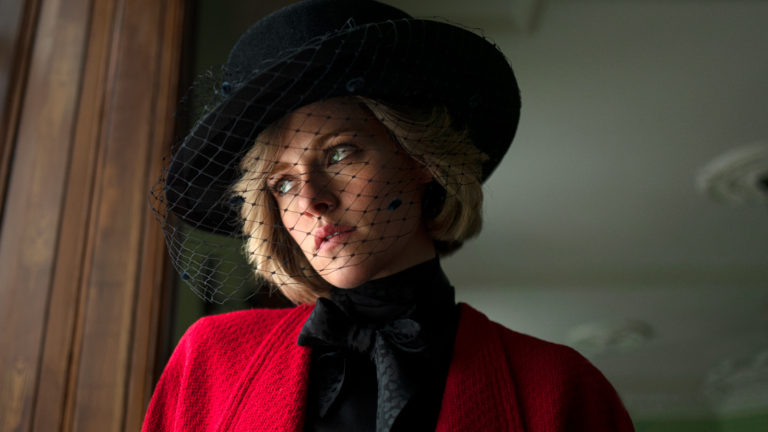Spencer (2021 | UK| 116 minutes | Pablo Larrain)
The title card calls Spencer a “haunted fable inspired by a true life tragedy”, but director Pablo Larraín films it like a straight-up psychological horror movie. It’s all low angles, alienating empty spaces, and a conspicuous number of dead pheasants. Set over the Christmas holiday with the Royals, the three-day span at Sandringham is bathed in perpetual fog, literal and mental, and there are ghosts all around.
We first meet Kristin Stewart in her command performance as Princess Diana oddly lost on the country roads surrounding both her own childhood home and the royal manor. Incongruously, she’s driving herself in her convertible Porsche to a dreaded uptight family gathering mired in staunch traditions. At this point, her marriage to Prince Charles is drawing its last gasps and the constant glare of the press and the palace minders have made shreds of her sanity.
Stewart’s portrayal of the princess is anything but subtle, but her ability to look phenomenal in clothing makes her the perfect muse for this fashion plate fantasia. She’s all crooked shoulders, indirect gazes, and twitchy mannerisms. Emphasizing Diana’s crippling bulimia, the film sets a simple soup course to Jonny Greenwood’s unnerving and oppressive jazz score and turns it into a nightmare of body horror and beautiful gowns sprawled across lavatory tiles. Elsewhere, drawing sharp contrasts, Larraín cuts to the team of dedicated chefs who prepare, with military precision, elaborate meals that they hope will please the princess. She regurgitates them tragically into toilet bowls with upsetting regularity.
Although Larraín’s sympathies are certainly with her, his depiction of Diana in crisis is not entirely sympathetic. She’s perpetually late to everything, both as inability to resist self-sabotage and as small acts of rebellion against the family’s oppressive attempts at control. She behaves oddly and increasingly resists family customs. You can see why the Windsors’ patience with this erratic publicly adored in-law has reached its limits.
Most of Diana’s complaints against the family are implied or occur offscreen; so she spends much of her screen time reactive and alone, further enhancing the unreliability of the narration as her breaks with reality intensify. Timothy Spall’s ghoulish Major Gregory, brought in to monitor her behavior, is always lurking. A beloved confidant/dresser played by Sally Hawkins is unceremoniously taken away from her, limiting any moments of healthy companionship. One of the few direct interactions comes in the form of an absolutely gutting conversation across a billiards table with Charles in which he coldly outlines the grim state of their relationship and their differing approaches to the life-draining responsibilities of modern royalty.
Stewart allows some light to return to her eyes during the rare moments that Diana spends with her sons, but even here she conveys a such sense of desperation to escape that it’s clear that her unspooling state is placing an heavy and undue burden on her beloved boys. As tensions peak, we see Diana tromping around the dewy grounds at night, exploring decaying mansions, seeing visions of Anne Boleyn, and weighing the value of her life through fashion montages. We all know there’s no happily ever after to this dark tale, but as it culminates with a declaration of love, a cheeky confrontation, a fantasy escape sequence, and what seems like a small imagined reclamation of agency, you can’t begrudge Larraín’s for trying to give her one.
Spencer arrives in theaters this weekend. This review originally appeared as part of our Telluride 2021 coverage.



